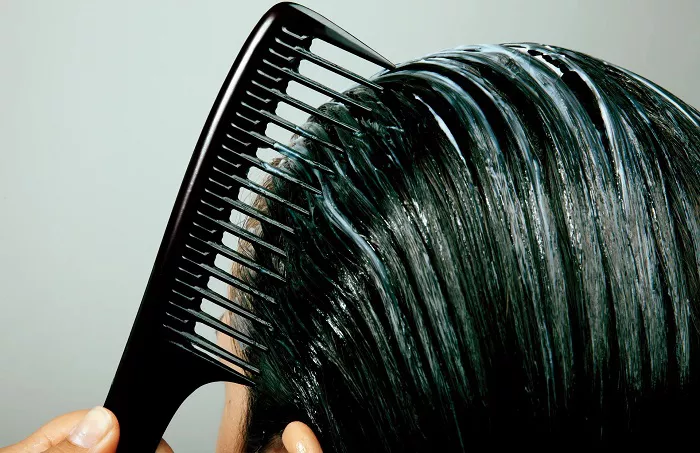If your hair feels dry, frizzy, or brittle, it may be time to give it some extra care. Deep-conditioning treatments can restore moisture, reduce damage, and leave your strands noticeably healthier. Unlike regular conditioner, which is part of your routine wash, deep conditioner is a more intensive treatment designed for less frequent use.
“A deep conditioner is a heavier moisturizer targeted to repair damage and not meant to be used every day,” says celebrity hairstylist and Los Angeles salon owner Sophie Rose Gutterman.
To learn how to properly deep-condition your hair, we spoke with Gutterman and celebrity stylist Suzette Boozer, a curly-hair expert for Dippity-Do. Below, they share essential hair care tips, from application techniques to choosing the right products and frequency.
What Is Deep Conditioner and Why Use It?
Deep conditioner is a concentrated, rich treatment that penetrates more deeply into the hair shaft than your everyday conditioner. According to Boozer, it helps “repair, strengthen, moisturize, and protect hair,” especially from heat styling, chemical treatments, and environmental exposure—all of which can damage hair health and lead to issues like split ends and frizz.
By incorporating this extra step into your hair care routine, you’re not only addressing existing problems like dryness or dullness, but also helping prevent future damage. Think of it as a restorative spa day for your hair—one that boosts elasticity, smoothness, and shine.
Look for nourishing ingredients like shea butter, avocado oil, olive oil, or coconut oil, which are known to deeply hydrate and condition the hair.
How to Deep-Condition Hair at Home: Step-by-Step
Detangle First: Begin by sectioning your hair into four or more parts. Use a wide-tooth comb to gently detangle each section.
Apply Product Generously: Coat each section of your hair from root to tip with deep conditioner. Boozer recommends covering your hair with a plastic cap to trap heat or using a steam cap or hooded dryer for enhanced results.
Let the Steam Help: The warmth from a shower or bath helps open up the hair cuticle, allowing the product to penetrate more effectively.
Should You Apply Deep Conditioner on Wet or Dry Hair?
Always follow the product’s instructions, but in most cases, deep conditioner works best on clean, damp hair. Boozer explains that water helps distribute the product evenly and enhances absorption.
How Long Should It Stay In?
Deep conditioners typically require 10 to 30 minutes, though some are designed for overnight use. “If the directions don’t warn against it, leaving it on a bit longer usually won’t hurt—just don’t overdo it with protein-based formulas,” Boozer advises. Gutterman adds that while she occasionally leaves her deep conditioner on overnight, it’s essential to choose a product that suits your hair’s specific needs.
Before or After Shampoo?
Most deep conditioners are applied after shampooing, when the hair is clean and can better absorb treatment. However, Gutterman notes that some specialized treatments—like protein masks or hot oil formulas—may be used before shampooing, depending on your hair goals.
How Often Should You Deep-Condition?
Frequency depends more on how you treat your hair than your hair type. If your hair is natural and not exposed to heat or chemicals, once a month might suffice. For those with dry, damaged, or color-treated hair—or anyone who frequently uses heat styling tools—Gutterman recommends deep-conditioning once a week, along with a heat-protectant leave-in conditioner.
Can You Overdo It?
Yes. Overusing deep conditioner, especially protein-rich types, can backfire. Too much protein can leave hair brittle and dry. Even too much moisture can weigh hair down and make it limp. “Listen to your hair,” says Boozer. “Adjust based on how it feels and responds.”
If you notice buildup, simply use a clarifying shampoo to reset your hair.
Incorporating deep conditioning into your hair care steps can make a noticeable difference in your hair’s moisture, strength, and overall health. Whether your strands are curly, color-treated, or simply stressed, this extra dose of care could be just what your hair needs to bounce back.
Related Topics:
- 6 Ways to Make Your Hair Silky in 5 Minutes
- How Often Should You Wash Your Hair? Dermatologists Explain
- The Lazy Girl’s Guide to Healthy Summer Hair


